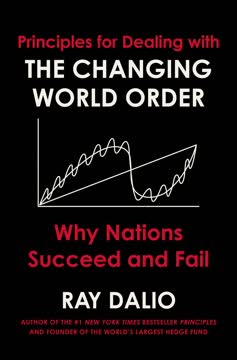重点摘要
1. 人类进步由交换和专业化驱动
交换对于文化进化就像性对于生物进化。
交换促进创新。 历史上,人类进步一直依赖于交换商品、服务和思想的能力。这种交换允许专业化,使个人能够专注于特定技能或产品,并通过交换获得所需的东西。结果是效率、生产力和创新的提高。
专业化推动进步。 随着社会的发展,人们可以越来越多地专注于特定角色,从农民到工匠再到商人。这种劳动分工使每个领域的专业知识和生产力得以提高。一个社会的集体知识和技能远远超过任何个人所能拥有的。
- 人类进步的关键驱动因素:
- 商品和服务的交换
- 劳动的专业化
- 思想和知识的分享
- 集体问题解决
2. 创新通过集体智慧和思想交流蓬勃发展
思想正在与来自世界各地的其他思想进行越来越频繁的“交配”。
思想孕育创新。 现代世界的互联性极大地加速了创新的速度。当来自不同领域和文化的思想结合在一起时,往往会产生新颖的解决方案和技术。这种人类的“集体大脑”远比任何个人的头脑更强大。
网络放大创造力。 互联网和全球通信网络极大地增加了我们分享和结合思想的能力。这导致了各个领域创造力和问题解决能力的爆炸性增长。开源项目、众包和协作平台以前所未有的方式利用了这种集体智慧。
- 促进创新的因素:
- 全球通信网络
- 跨学科合作
- 开源和众包项目
- 快速原型和迭代
- 跨文化思想交流
3. 过去两个世纪繁荣显著增加
自1800年以来,世界人口增加了六倍,但平均寿命增加了一倍多,实际收入增加了九倍多。
全球生活水平大幅提高。 尽管偶有挫折和持续的挑战,人类繁荣的总体轨迹一直显著向好。在过去的两个世纪里,我们见证了数十亿人健康、财富和生活质量的显著改善。
进步不仅限于经济。 虽然经济增长显著,但进步在许多其他领域也很明显。教育水平显著提高,婴儿死亡率大幅下降,信息和技术的获取大幅扩展。即使面对人口增长,这些成果也得到了广泛分布。
- 进步的关键指标:
- 寿命:自1800年以来增加了一倍多
- 实际收入:自1800年以来增加了九倍
- 识字率:从1820年的12%到2015年的86%
- 极端贫困:从1820年的94%到2015年的10%
- 儿童死亡率:从1800年的43%到2015年的4%
4. 尽管生活质量持续改善,悲观情绪依然存在
悲观情绪一直是票房大卖。
人类天性中的负面偏见。 尽管有大量进步的证据,许多人仍倾向于关注问题和潜在灾难。这种悲观偏见深深植根于人类心理,并常常被媒体和文化叙事所强化。
乐观面临的挑战。 尽管对人类进步的乐观是有根据的,但它面临着几个障碍。这些包括倾向于美化过去、难以察觉渐进的改善,以及解决旧问题往往会暴露新挑战。此外,进步的好处往往被视为理所当然,而其缺点则更为显眼。
- 持续悲观的原因:
- 人类心理中的负面偏见
- 媒体对问题和危机的关注
- 对理想化过去的怀旧
- 忽视渐进的改善
- 解决旧问题时出现的新挑战
5. 非洲的经济潜力在于拥抱贸易和产权
赋予当地人拥有、开发和从自然资源中获利的权力,他们通常会保护和珍惜这些资源。
经济自由推动增长。 非洲走向繁荣的道路在于拥抱自由市场、产权和贸易。那些采纳这些原则的国家,如博茨瓦纳,已经见证了显著的经济增长和生活水平的改善。
创业和创新。 非洲拥有丰富的创业人才和应对本地挑战的创新解决方案。通过消除商业创建和增长的障碍,非洲国家可以释放这种潜力。例如,移动银行已经改变了整个大陆的金融服务,展示了创新在跨越传统发展阶段中的力量。
- 非洲经济增长的关键:
- 确保产权
- 减少商业创建的障碍
- 增加非洲内部和全球贸易
- 投资基础设施和教育
- 利用技术促进发展
6. 气候变化问题应与经济现实平衡
如果管理不当,气候缓解可能对人类福利造成与气候变化同样大的损害。
平衡环境和经济问题。 虽然气候变化带来了真正的挑战,但考虑拟议解决方案的经济影响至关重要。过于激进的碳减排政策可能会阻碍经济增长,特别是在发展中国家,可能造成的损害超过好处。
技术解决方案。 我们不应仅仅关注减少碳排放,而应投资于开发能够提供清洁、廉价能源的新技术。核能、改进的太阳能技术和碳捕获方法提供了有前途的途径,可以在不牺牲经济进步的情况下应对气候问题。
- 应对气候变化的方法:
- 投资清洁能源研究和开发
- 鼓励市场驱动的解决方案
- 平衡环境保护与经济增长
- 适应气候变化条件
- 专注于韧性和技术创新
7. 未来承诺持续创新和生活水平提高
二十一世纪将是一个美好的时代。
加速创新。 技术进步的速度可能会继续加快,由全球经济的日益互联和集体智慧的力量驱动。这将为解决当今许多紧迫问题提供解决方案,并创造新的机会促进人类繁荣。
全球繁荣上升。 随着更多国家拥抱经济自由并利用技术,我们可以期待全球生活水平的持续改善。尽管挑战依然存在,特别是在不平等和环境可持续性方面,人类进步的总体轨迹为未来的乐观提供了理由。
- 对未来乐观的原因:
- 持续的技术突破
- 扩大教育和信息获取
- 不断增长的全球中产阶级
- 增加的预期寿命和健康结果
- 可持续能源解决方案的潜力
- 人工智能和自动化的进步
人类进步并非不可避免,但通过理解驱动它的力量——交换、专业化和创新——我们可以努力创造有利于所有人持续进步和繁荣的条件。
最后更新日期:
FAQ
What's The Rational Optimist: How Prosperity Evolves about?
- Focus on human progress: The book explores the evolution of human prosperity through innovation, exchange, and specialization, highlighting humanity's unique ability to adapt and thrive.
- Collective intelligence: Ridley argues that progress is driven by collective intelligence, where ideas and innovations build upon each other, rather than individual brilliance alone.
- Historical perspective: The author traces the development of societies from hunter-gatherer groups to modern economies, emphasizing key turning points that have shaped prosperity.
Why should I read The Rational Optimist by Matt Ridley?
- Challenging pessimism: Ridley offers a counter-narrative to the prevalent pessimism about the future, suggesting that human ingenuity and cooperation can solve global issues.
- Evidence-based optimism: The book is grounded in historical data and examples, making a compelling case for rational optimism about humanity's future.
- Understanding economic evolution: Readers gain insights into how economic systems and human behavior have evolved, informing perspectives on current events and policies.
What are the key takeaways of The Rational Optimist?
- Importance of exchange: Ridley emphasizes that exchange is crucial to cultural evolution, fostering innovation and prosperity much like sex does for biological evolution.
- Collective brain concept: Human progress results from collective intelligence, where shared knowledge and skills drive innovation.
- Rational optimism: Ridley encourages a rationally optimistic view of the future, suggesting that cooperation and innovation can overcome challenges.
What are the best quotes from The Rational Optimist and what do they mean?
- "The more human beings diversified...": This quote highlights the book's thesis that specialization and exchange drive economic growth and prosperity.
- "It was not something...": Ridley emphasizes the importance of collective intelligence, suggesting that collaboration and shared knowledge are key to innovation.
- "Rational optimism holds that...": Reflects Ridley's belief in markets and human ingenuity to address global challenges.
How does The Rational Optimist define prosperity?
- Increased standard of living: Prosperity is defined as achieving a higher standard of living through innovation, specialization, and exchange.
- Collective benefits: It's about the overall improvement in quality of life for society, not just individual wealth.
- Historical context: The book illustrates progress from subsistence living to complex economies, resulting in greater access to resources and opportunities.
What role does trade play in The Rational Optimist?
- Foundation of prosperity: Trade is fundamental to human prosperity, enabling specialization and efficient resource allocation.
- Cultural evolution: Trade fosters cultural evolution, allowing ideas and innovations to spread and develop over time.
- Historical examples: Ridley provides examples of how trade networks have facilitated the growth of civilizations and economies.
How does The Rational Optimist address environmental concerns?
- Optimistic outlook: Ridley suggests human innovation can address environmental challenges, arguing that global division of labor leads to wealth and sustainability.
- Sustainable practices: Discusses advancements in agriculture and technology that can lead to sustainable practices benefiting humanity and the environment.
- Historical context: Provides examples of past innovations leading to environmental improvements, such as cleaner air and water.
What historical turning points does The Rational Optimist highlight?
- Agricultural revolution: Transition from hunter-gatherer societies to agricultural ones allowed for greater population density and specialization.
- Industrial revolution: Emphasizes the impact on economic growth and living standards, showcasing technological advancements transforming societies.
- Information age: Highlights ongoing changes with the potential to further enhance human prosperity.
How does The Rational Optimist explain the concept of collective intelligence?
- Collaboration over individualism: Progress is driven by collective intelligence, where individuals collaborate and share knowledge for greater outcomes.
- Cumulative culture: Cultural evolution occurs through the accumulation and sharing of ideas, similar to biological evolution.
- Examples of success: Provides examples of how collective intelligence has led to advancements in technology, science, and society.
What criticisms does The Rational Optimist address regarding capitalism?
- Misconceptions of capitalism: Counters the notion that capitalism is inherently exploitative, arguing it has led to greater prosperity and improved living standards.
- Role of markets: Emphasizes the importance of markets in facilitating exchange and innovation, essential for human progress.
- Historical context: Provides examples of capitalism evolving and adapting, leading to positive societal outcomes.
How does The Rational Optimist envision the future?
- Rational optimism: Belief that humanity can overcome challenges through innovation, cooperation, and market evolution.
- Potential for improvement: Suggests future advancements in technology and social organization can lead to greater prosperity and quality of life.
- Call to action: Encourages embracing change and being rationally optimistic, believing progress is possible with adaptation and innovation.
What specific methods does Ridley suggest for improving economic conditions in Africa in The Rational Optimist?
- Empowering property rights: Establishing secure property rights is essential for fostering entrepreneurship and investment.
- Decentralized aid: Advocates for directing aid to specific projects rather than through large bureaucracies, encouraging accountability.
- Encouraging trade: Emphasizes reducing trade barriers and fostering free-trade zones to improve economic conditions.
评论
《理性乐观派》认为,人类的进步和繁荣是由贸易、专业化和创新推动的。评论褒贬不一,有人赞扬里德利的乐观观点和历史分析,也有人批评他自由意志主义的偏见和对环境问题的忽视。支持者欣赏这本书对悲观叙事的挑战,而批评者则认为里德利过于简化复杂问题,并忽视了未来可能的挑战。尽管有些人不同意里德利的结论,但书中关于交流和集体智慧推动人类进步的核心论点得到了广泛认可。
Similar Books




















